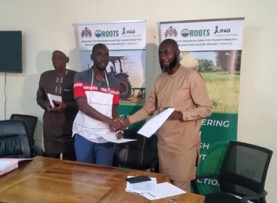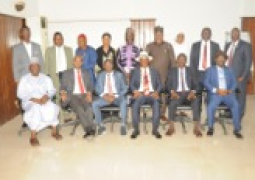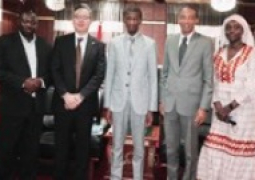
The support, which has been described as timely, includes the provision of certified seeds and chemical fertilisers ranging from Urea as well as NPK fertilisers among others.
The Roots project is implementing a three-year declining subsidized inputs support program for rice production in its rice intervention communities. The program which started last year benefitted 26 communities. However, for this year's rainy season production, 26 new sites have been included in the program after initial assessment from the regional agricultural directorates.
The input support program for rice, officials said, is designed to assist the membership of rice farmer organizations not only to improve their yields and productivity, but also to accumulate the liquidity necessary to independently underwrite their own production activities in the medium term.
In a bid to foster ownership and sustainability, officials further added, the program is based on a partial and declining subsidy mechanism over a three year period. In the first year, the roots project will offset 80% of the total cost, 50% in the second year, and 20% in year three.
Speaking at the signing ceremony held at the Roots conference hall, the minister of Agriculture, Demba Sabally, said: “Rice is the staple food of The Gambia, with an estimated per capita consumption of 117kg per annum. Regrettably however, only 19% of national consumption is produced locally. Clearly, this situation is unsustainable, and the government has made it a priority to address this anomaly.”
Minister Sabally added: “While last year’s rainy season input support program targeted a total of 1,467 hectares, while this year’s program will increase coverage to 2, 534 hectares thus adding more than 1, 000 hectares to the program. Secondly, the number of communities benefiting from the program will double from 26 last year to 52 this year which will double the impact of the program in terms of outreach.”
He maintained that the roots rainy season input support program will as a result provide 69 tons of certified seed under the guidance of the National Seed Secretariat, 764 tons of fertilizer (Urea and NPK), and ploughing services covering more than 2, 500 hectares.
Mamour Alieu Jagne, the Project Director of Roots, said: “The signing ceremony is another milestone in our quest to increase food production in the country and improve the livelihood of farmers and by extension contributing to our goals of achieving food self-sufficiency particularly on rice production,” he postulated.
“We are also trying to promote salt-tolerance verities which will go a long way in allowing us to reclaimed lands that are not in use due to salt intrusion. By doing this, we will be expanding the hectares for rice cultivation.”
Musa Huma, the Director General of Agriculture, said: “Last year, the government made a lot of input support in terms of seeds, fertilizers and reduction of prices on fertilizers. This has impacted greatly on production and productivity of commodities that are grown in the country especially on rice, maize and groundnut among others.”
“Therefore, to take stride in the attainment of the goals of the government in food self-sufficiency in term of nutrition and food security by 2030, we must work according to the value chains of every commodities in the country,” he said, adding that the cultivation of rice in the country is predominantly dominated by women, thus providing them with materials to enhance their production is key.
He urged the beneficiary’s communities to put up sustainability mechanisms. “Those that are supported this year, we don’t expect you to be supported next year. However, we expect you to be seeds givers and growers.”
“The signing ceremony can’t be over emphasised and the timely provision of inputs to farmers will go a long way in mitigating climate change. We also need to entice the young people of the country to venture into agriculture production, especially mechanizations,” Tom Senghore, a representative of the NARI said.
Moro Manga, the director of the National Seeds Secretariat, Fatou Jammeh-Touray, the DPS Project and programmes of the Ministry of Agriculture, Peter Baldeh, president of the National Rice Farmers Association both described the signing ceremony as timely and the right direction.




